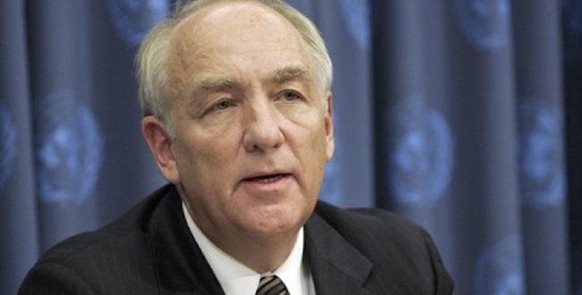US Ambassador for Global Criminal Justice Stephen Rapp will spend five days in Sri Lanka meeting with government, political and civil society officials "on a range of issues focusing on Sri Lanka’s justice, accountability, and reconciliation processes," the US State Department said. While Rapp was previously holding the title Ambassador-at-large for War Crimes Issues, Rapp’s office released a damaging "Report to Congress on Incidents During the Recent Conflict in Sri Lanka," to US Congress as required by the US Supplemental Appropriations Act of 2009. Also, in July 2010, US and UK representatives of Tamil diaspora groups briefed Ambassador Stephen Rapp, and his staff on the historical context of the Tamil struggle, and submitted supporting evidence and affidavits on war-crimes and crimes against humanity committed by the Sri Lankan State on Eezham Tamils in the island of Sri Lanka.
 The visit comes as the UN Human Rights Council meets in March to discuss whether Sri Lanka has shown progress towards reining in alleged rights abuses and investigated suspected war crimes, ABC Australia reported.
The visit comes as the UN Human Rights Council meets in March to discuss whether Sri Lanka has shown progress towards reining in alleged rights abuses and investigated suspected war crimes, ABC Australia reported.
ABC added that "[t]he UN estimates that the conflict for a separate homeland for ethnic Tamils in the Sinhalese-majority nation cost at least 100,000 lives between 1972 and 2009. Sri Lanka has resisted calls to investigate allegations that up to 40,000 ethnic Tamil civilians were killed by the security forces during the final push that crushed the Tamil rebels," and noted that "UN rights chief Navi Pillay has warned Sri Lanka that it faces an international probe into the allegations if it has not shown progress by March."
As reflected in the war-crimes report by Rapp’s office, Rapp is known to have been diligently accumulating evidence of criminality of both protagonists of the conflict in Sri Lanka after the end of the civil war, political observers in Washington said.
PDF: US State Department Report
The US State Department war crimes report to the Senate submitted as mandated by the US Supplemental Appropriations Act, detailed day-by-day account in a format similar to a "model indictment," and said the alleged incidents in the final stages of war may constitute "violations of International Humanitarian Law (IHL) or crimes against humanity and related harms.
The report while not reaching any legal conclusions listed Common Article 3 of Geneva Conventions, statutes of International Criminal Tribunal for the former Yugoslavia (ICTY), and Rwanda (ICTR), and the statutes of International Criminal Court (ICC) as "useful foundation for reviewing the conduct" described in the State Department’s report.
In June 2010, Stephen Rapp, said, "what’s been announced to date has not met the standard. They’re [Sri Lanka is] telling use it does have that capacity, to investigate these cases, to follow up and call witnesses. We’re hearing it, but we’re not seeing it." Rapp’s statement came as a response to a question from Inner City Press which asked Rapp if "Lessons Learned" [Commission] was adequate to carry out investigations, ICP reported.
The meeting in July 2010 between Ambassador and members of Tamils Against Genocide (TAG) and Tamil Political Action Council (USTPAC) focused on the credibility of Sri Lanka’s internal efforts, progress of external efforts by the US government and the United Nations, continuing militarization of the NorthEast, progress on resettlement, the expectations of the Sri Lanka’s local commission, and the status of Tamil Prisoners of War.
In an earlier Washington Post interview Rapp said that the United States’ approach to the Hague-based criminal court is under "active review" and that the Obama administration is exploring the prospect of being "more actively engaged with the [the court] in places where it’s consistent with our interests and policies."
In a sign of a shift, Rapp led a delegation of U.S. diplomats to a conference of the ICC’s member governments in The Hague, the first time the United States has done so in nearly eight years. But the U.S. review, he added, "will not result in a decision to submit the ICC treaty to the Senate in the near future," Rapp told the Washington Post.
(For updates you can share with your friends, follow TNN on Facebook and Twitter )
